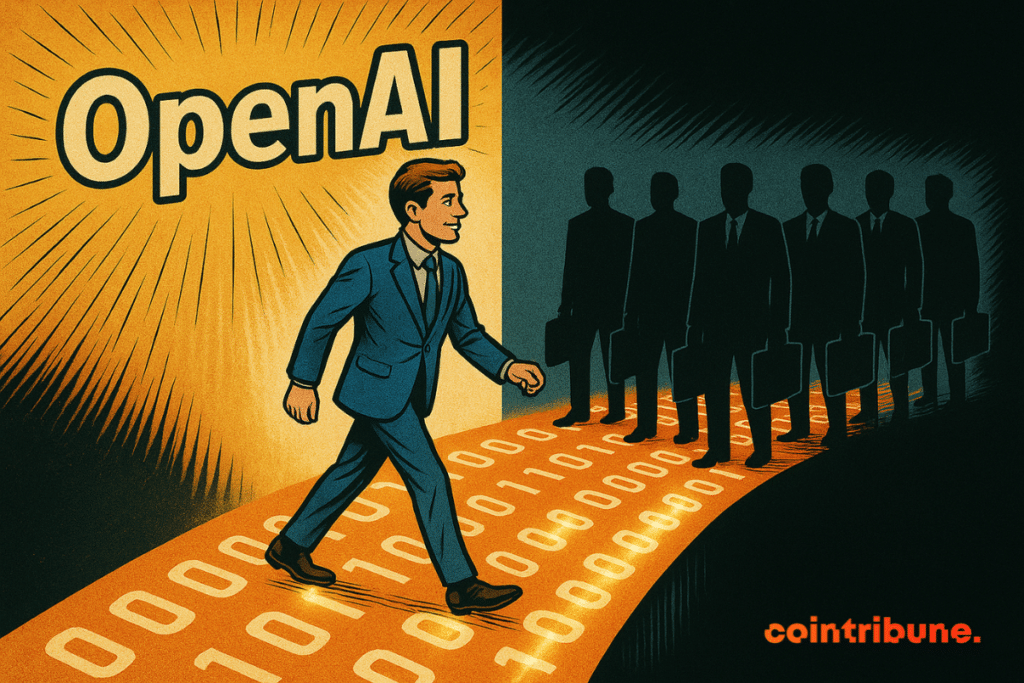No, OpenAI Will Not Be For Sale... And That Changes Everything For AI
Is OpenAI really backtracking, or playing the card of absolute transparency? The structural turnaround announced in early May raises questions. Do Elon Musk’s accusations of greed against Sam Altman find an echo here, or an unyielding denial? Far from slogans, this transformation of OpenAI deserves examination. Not in the media foam, but in the mechanics of its governance. Behind the code, convictions?

In Brief
- OpenAI abandons its for-profit model in favor of a Public Benefit Corporation controlled by the non-profit.
- Sam Altman states he wants to democratize AI while raising massive capital for its development.
- Elon Musk accuses OpenAI of betrayal, once demanding full control or a merger with Tesla.
The Great Return to the Roots: OpenAI Chooses the PBC
OpenAI, now valued at $300 billion, has decided to not become a fully capitalistic company. Goodbye to the purely for-profit model. Welcome to a PBC — Public Benefit Corporation — controlled by the parent nonprofit organization. This change is not cosmetic. It ends an era of ambiguity where the company oscillated between philanthropic ambition and capitalist pressure.
In a letter dated May 2025, Sam Altman summarizes this decision as follows:
OpenAI is today a nonprofit organization, and it will remain so.
This clarity contrasts with the turbulence of 2024, when OpenAI claimed that a for-profit pivot was inevitable.
The reality was clear: to build AGI, colossal sums must be raised. Hundreds of billions, perhaps trillions. Altman elaborates:
We want to put our tools in everyone’s hands. That requires huge resources.
The solution found? A PBC entity aligned with the association’s mission, yet open to investment. In other words, impact capitalism but with structural safeguards. The choice of the PBC format is not incidental: other labs like Anthropic or X.ai have already adopted it. OpenAI sells nothing. It changes vehicles. And it stays in control.
Musk vs Altman: AI Model Duel, Battle of Visions
This reorganization is not a sign of weakness. It is primarily a calculated response to a legal challenge. Early 2024, Elon Musk — OpenAI co-founder — filed a lawsuit against Sam Altman. In his complaint, he accuses him of having “manipulated Musk into co-founding a fake nonprofit association” in order to turn it into a private company.
OpenAI, in a documented counterattack, reveals that Musk demanded full control of the entity or its merger with Tesla. A version of the facts confirmed by internal emails: “Tesla is the only way to compete with Google,” Musk wrote.
When he fails to get his way, he slams the door and founds xAI. The ego war turns into a model war. One advocates for an independent regulated AI. The other dreams of a super-AI integrated into his industrial empire.
OpenAI has chosen the democratic path. Altman owns it:
We want AI that benefits everyone. It’s not a utopia, it’s a structure.
The message is clear: no individual, no matter how rich, should control such a powerful technology alone.
Faced with criticism, OpenAI does not back down. It strengthens its backbone. And it writes it black on white.
A Hybrid Structure for XXL Ambitions
OpenAI keeps the reins but revises its financial mechanics. The capped-profit structure is abandoned. From now on, everyone will have shares. Simple, direct, transparent. The nonprofit stays in control but also becomes a major shareholder.
This move is accompanied by a collective yield goal. Altman is explicit:
We want our PBC to provide resources to the parent association to support democratic AI.
Some figures:
- OpenAI aims for $12.7 billion in revenue in 2025;
- 2026 goal: $29.4 billion;
- $40 billion recently raised, valued at $300 billion;
- Elon Musk contributed only $45 million to the initial nonprofit;
- The PBC enables fundraising without ceding control.
This hybrid model gives wings to OpenAI. It ends the untenable equation: exponential growth vs. rigid ethics. Above all, it protects the integrity of the mission. With this evolution, OpenAI does not renounce its origins. It adapts to the reality of a global AGI race. And asserts its difference where others have already yielded to all-profit.
OpenAI may never have been so true to its name. It opens, structures, and preserves. But all this comes at a cost. In an internal note recently revealed, Altman signals an absurd truth: saying “thank you” to ChatGPT costs money. At large scale, this digital politeness costs a fortune.
Maximize your Cointribune experience with our "Read to Earn" program! For every article you read, earn points and access exclusive rewards. Sign up now and start earning benefits.
La révolution blockchain et crypto est en marche ! Et le jour où les impacts se feront ressentir sur l’économie la plus vulnérable de ce Monde, contre toute espérance, je dirai que j’y étais pour quelque chose
The views, thoughts, and opinions expressed in this article belong solely to the author, and should not be taken as investment advice. Do your own research before taking any investment decisions.